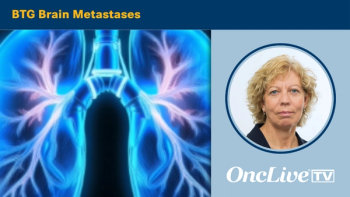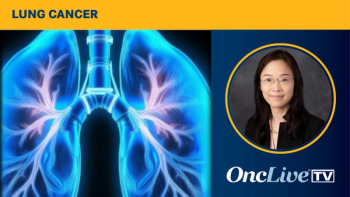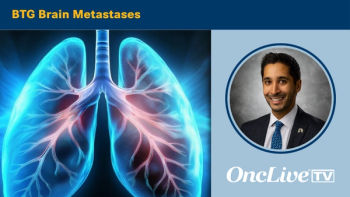
Nivolumab Plus Chemotherapy Shows Similar Efficacy to Nivolumab Monotherapy in NSCLC
Nivolumab combined with platinum-based doublet chemotherapy achieved a manageable safety profile with clinical efficacy that was similar to single-agent nivolumab in patients with advanced NSCLC.
Scott J. Antonia, MD, PhD
Nivolumab (Opdivo), an investigational PD-1 immune checkpoint inhibitor, combined with platinum-based doublet chemotherapy (PT-DC) achieved a manageable safety profile with clinical efficacy that was similar to single-agent nivolumab in patients with advanced non-small cell lung cancer (NSCLC), according to updated data from the Checkmate-012 study presented at the 2014 Multidisciplinary Symposium in Thoracic Oncology.
Lead author Scott J. Antonia, MD, PhD, a senior researcher at Moffitt Cancer Center in Tampa, Florida, noted that further research is still needed to understand nivolumab’s clinical efficacy when combined with PT-DC.
“Our data showed a distinctive lack of disease progression, but it’s also true that 3 arms of this 4-arm study performed better than chemotherapy alone but not better than nivolumab alone,” he said. “We found that the 5-mg dose of nivolumab [compared to 10 mg in the other study arms] shows an encouraging 18-month OS rate of 86% with a lack of progressive disease at first restaging. My opinion is that these data support further evaluation of combined therapies.”
The primary objective of Checkmate-012 was to establish safety and tolerability; secondary objectives were to achieve an objective response rate (ORR) and progression free survival (PFS) rate at 24 weeks. Increasing overall survival (OS) was an exploratory objective of this study.
Chemotherapy-naïve patients (n = 56) with advanced NSCLC were assigned by histology to 1 of 4 cohorts in this phase I dose de-escalation trial. Patients received 4 21-day cycles of one of the following:
- Squamous (n = 12) — nivolumab 10 mg/kg IV every 3 weeks plus concurrent IV gemcitabine 1250 mg/m2 plus cisplatin 75 mg/m2
- Non-squamous (n = 15) — nivolumab 10 mg/ kg IV every 3 weeks plus concurrent IV pemetrexed 500 mg/m2 plus cisplatin 75 mg/m2
- Any histology (n = 15) — nivolumab 10 mg/kg IV every 3 weeks plus concurrent IV paclitaxel 200 mg/m2 plus carboplatin AUC6
- Any histology (n = 14) — nivolumab 5 mg/kg IV every 3 weeks plus concurrent IV paclitaxel 200 mg/m2 plus carboplatin AUC6
In all cases, patients continued their assigned regimen until either disease progression resumed or toxicity became intolerable. “I would characterize the toxicities as being the usual ones associated with chemotherapy or nivolumab used in an additive fashion,” said Antonia. “No dose-limiting toxicities were seen during the first 6 weeks, or 2 cycles, of treatment.”
The kinetics data showed a rapid response that the study team considered typical for both nivolumab monotherapy and single modality chemotherapy. Additionally, responses were observed regardless of tumor PD-L1 expression. “PD-L1 doesn’t seem to be important in this case,” Antonia said.
After a median follow up of 75 weeks, 45% of patients reported grade 3-4 treatment-related adverse events (AEs). The range was 25% to 73% across all study arms. Grade 3-4 pneumonitis occurred in 7% of patients (n = 4). One patient had both pneumonitis and neutropenia and one had a greatly decreased neutrophil count; these 3 events were all grade 4. Ultimately, 21% of patients (n = 12) discontinued study participation due to treatment-related AEs. There were no treatment-related deaths.
As discussed, the nivolumab 5-mg study arm achieved an 18-month OS rate of 86%. The 18-month OS rates in the 3 arms with nivolumab 10 mg and the PB-CT regimens ranged from 33% to 60%. The median OS for those arms have been reached and range from 51 to 83 weeks. The median OS for the nivolumab 5-mg study arm has not yet been reached but, “will likely be longer than any of the other arms’ OS rates based on all the data we’ve seen so far,” Antonia said.
Antonia SJ, Brahmer JR, Gettinger S, et al. Nivolumab (Anti-PD-1; BMS-936558, ONO-4538) in combination with platinum-based doublet chemotherapy (PT-DC) in advanced non-small cell lung cancer (NSCLC). Presented at: 2014 Multidisciplinary Symposium in Thoracic Oncology; October 30-November 1, 2014; Chicago, IL. Abstract: 3.
<<<



































